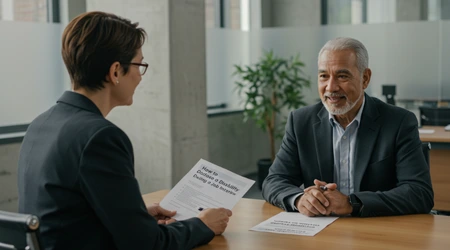How to Disclose a Disability During a Job Interview (or Not)

Deciding whether to disclose a disability during a job interview is a deeply personal choice, layered with complexity and nuance.
For many, it’s not just about sharing a medical condition it’s about navigating stigma, workplace culture, and legal protections while showcasing their qualifications.
In 2025, as the job market evolves with a growing emphasis on diversity and inclusion, this decision carries new weight.
The Americans with Disabilities Act (ADA) ensures protections, but real-world dynamics demand strategic thinking.
This article explores the pros, cons, and strategies of disclosure, offering practical insights for job seekers with disabilities. Should you reveal your truth, or keep it private to let your skills shine?
The modern workplace is shifting. Companies increasingly prioritize inclusivity, driven by both legal mandates and a recognition that diverse teams fuel innovation.
Yet, disclosing a disability remains a high-stakes decision. A 2023 study by the U.S.
Bureau of Labor Statistics found that only 21% of people with disabilities were employed, compared to 65% of those without. This gap underscores the challenges, including potential bias during hiring.
This guide provides actionable advice, real-world examples, and a framework to help you decide when or if disclosure is right for you.
Understanding the Stakes of Disclosure
Navigating the decision to disclose a disability during a job interview requires weighing benefits against risks.
Disclosure can secure accommodations, ensuring you perform at your best. For example, requesting a sign language interpreter for a deaf candidate can make the interview accessible.
However, premature disclosure might invite unconscious bias, with some employers focusing on limitations rather than strengths. The ADA prohibits disability-related questions pre-offer, but human perceptions are harder to regulate.
Timing is critical. Disclosing too early, like in a cover letter, risks overshadowing your qualifications. Waiting until after a job offer might feel safer but could complicate accommodation requests.
Consider the job’s demands: if your disability, like autism, affects communication, early disclosure might clarify behaviors during the interview. Strategic disclosure aligns your needs with the employer’s expectations, fostering trust.
++ The Best Online Job Platforms with Accessibility in Mind
Another factor is workplace culture. Researching a company’s inclusivity through Glassdoor reviews or diversity reports can guide your decision.
A progressive employer might view disclosure positively, while others may not.
Reflect on your disability’s visibility: visible conditions, like mobility impairments, often necessitate earlier disclosure to address practical needs, such as accessible interview spaces.

Legal Protections and Your Rights
The ADA is your shield. It bans employers from asking about disabilities before a job offer, ensuring focus remains on your skills.
You’re not obligated to disclose a disability during a job interview unless accommodations are needed for the hiring process.
Also read: The importance of representation in leadership positions
For instance, a candidate with dyslexia might request extra time for a written test. Post-offer, employers can ask about accommodations, but only if they ask all candidates equally.
Table: Key ADA Protections for Job Seekers
| Aspect | Details |
|---|---|
| Pre-Offer Questions | Employers cannot ask about disabilities or medical history. |
| Accommodation Requests | Must be provided if reasonable and requested, without undue hardship. |
| Post-Offer Inquiries | Allowed if applied uniformly to all candidates in the same job category. |
| Confidentiality | Disability information must remain private, shared only with HR or managers. |
These protections empower you to control disclosure timing. However, some employers may lack ADA awareness, so preparation is key. Knowing your rights builds confidence to advocate for yourself.
Legal nuances vary by employer size. Businesses with fewer than 15 employees may be exempt from certain ADA requirements, impacting accommodation feasibility.
If you’re applying to small startups, verify their policies. Conversely, large corporations often have structured diversity programs, making disclosure less risky. Always document interactions to protect your rights if issues arise.
Read more: Affirmative job vacancies: how they work and where to find them
When to Disclose: Strategic Timing
Choosing when to disclose a disability during a job interview is like navigating a tightrope. Disclose too soon, and you risk bias; too late, and you might seem deceptive.
Pre-interview disclosure suits visible disabilities or when accommodations, like large-print materials, are needed.
For example, Sarah, a visually impaired candidate, emailed the recruiter to request digital documents, ensuring accessibility without derailing the interview focus.
During the interview, disclosure can address visible traits or performance concerns. Imagine a candidate with cerebral palsy explaining how adaptive technology enables them to excel in data analysis.
This proactive approach shifts the narrative to capability. Post-offer disclosure works if accommodations, like flexible hours for medical appointments, arise later. Timing depends on your comfort and the job’s demands.
Consider the role’s context. If the position involves public speaking and your disability affects speech, early disclosure can clarify your approach, like using assistive devices.
Conversely, for desk-based roles, you might delay until accommodations are necessary. Always prioritize clarity: vague disclosures can raise more questions than answers. Practice a concise script to stay in control.
How to Disclose: Crafting Your Narrative
If you choose to disclose a disability during a job interview, how you frame it matters. Focus on strengths, not limitations.
For example, instead of saying, “I have ADHD and struggle with focus,” try, “My ADHD has honed my ability to hyper-focus on complex tasks with the right tools.” This approach highlights resilience and problem-solving.
Prepare a brief, positive script. For instance, John, who uses a wheelchair, might say, “I navigate my work environment with a wheelchair and use adaptive software to stay productive.”
This addresses the disability while emphasizing capability. Avoid oversharing medical details; focus on job-relevant information. Employers need to know how you’ll perform, not your medical history.
Anticipate questions without defensiveness. If an interviewer seems surprised, redirect to your qualifications: “My condition doesn’t impact my coding skills, as I’ve delivered projects for X clients.”
Research the company’s accommodation history to tailor your approach. A supportive employer might appreciate your transparency, strengthening your candidacy. Practice with a mentor to refine your delivery.
When Not to Disclose: Protecting Your Privacy
Sometimes, choosing not to disclose a disability during a job interview is strategic. If your disability, like depression, doesn’t affect job performance or require accommodations, privacy might be best.
The ADA supports this choice: you’re not obligated to share unless accommodations are needed. This preserves focus on your skills, avoiding potential bias.
Consider the risk of stigma. Some employers, despite legal protections, may harbor outdated views. For instance, a candidate with an invisible disability, like PTSD, might delay disclosure until trust is built post-hire.
This approach allows you to prove your competence first. However, ensure your condition won’t unexpectedly impact performance, as late disclosure can strain relationships.
Weigh long-term implications. If you join a company without disclosing and later need accommodations, explaining the delay might be tricky.
Research suggests 60% of employees with disabilities disclose only when necessary, per a 2024 SHRM report.
This reflects a cautious approach, prioritizing performance over premature transparency. Trust your instincts and the company’s inclusivity track record.
Practical Examples and Analogies
Think of disclosure like a chess game: every move is calculated to protect your position while advancing your goal.
Example 1: Maria, who has autism, disclosed her need for clear instructions during an interview for a graphic design role. She explained how structured tasks enhance her creativity, securing the job.
Example 2: Tom, with a hearing impairment, requested a quiet interview room, framing it as a way to showcase his analytical skills without distraction.
These examples show disclosure as a tool, not a barrier. By addressing needs upfront, you build trust and clarity. However, non-disclosure can also work.
If your disability doesn’t impact the job, like mild arthritis in a remote role, silence might keep the focus on your expertise. Always align your choice with the role’s demands and your comfort.
The chess analogy extends to preparation. Just as a player studies opponents, research the company’s culture. Check their diversity policies or LinkedIn posts for inclusivity signals.
This informs whether disclosure will be met with understanding or skepticism. Your strategy should balance authenticity with pragmatism, ensuring your skills remain the focus.
Entrepreneurship and Disability: A Unique Perspective

For entrepreneurs, deciding to disclose a disability during a job interview takes on a different flavor. If you’re pitching to investors or clients, disclosure can humanize your brand.
For instance, a founder with dyslexia might share how it shaped their innovative problem-solving, building rapport. In 2025, authenticity resonates in entrepreneurial spaces, where personal stories drive connection.
However, disclosure in entrepreneurship isn’t always about accommodations. It’s about leveraging your unique perspective.
Consider a startup founder with ADHD who highlights their ability to think outside the box. This can attract investors valuing creativity.
Conversely, withholding disclosure might avoid distractions in high-stakes pitches where focus is on the business model.
Entrepreneurial disclosure also depends on audience. Clients may appreciate transparency if it ties to your mission, like accessibility-focused products.
Investors, however, might prioritize ROI over personal stories. Gauge their values through prior interactions or public statements.
A well-timed disclosure can position you as a trailblazer, but misjudge the room, and it could overshadow your pitch.
SEO and Accessibility in the Job Market
In 2025, disclose a disability during a job interview also intersects with digital visibility. Job seekers with disabilities can optimize their online presence to reflect their skills, not their conditions.
For example, a LinkedIn profile emphasizing certifications and projects keeps the focus professional. If you disclose online, frame it positively, like highlighting adaptive tools that boost productivity.
Employers also use SEO to attract diverse talent. Companies posting inclusive job descriptions using terms like “accessible workplace” or “reasonable accommodations” signal openness.
Search for these keywords when researching roles. Conversely, candidates can use SEO to find disability-friendly employers by targeting terms like “inclusive hiring 2025” in job boards.
Digital accessibility matters too. If you need accommodations, like screen readers, ensure the company’s application portal is ADA-compliant. Test the platform beforehand or contact HR to confirm.
This proactive step aligns with disclosure decisions, ensuring you can compete on equal footing. Your online narrative should mirror your interview strategy: confident and capability-focused.
Conclusion: Your Choice, Your Power
Deciding whether to disclose a disability during a job interview is a deeply personal journey, shaped by your unique circumstances and the evolving 2025 job market.
It’s not just about legal rights or accommodations it’s about owning your narrative. Whether you choose transparency to secure support or privacy to let your skills lead, preparation is your greatest ally.
Research the employer, practice your approach, and trust your instincts. The goal is to showcase your value, not your challenges.
The modern workplace is increasingly inclusive, but biases linger. By understanding your rights, timing disclosure strategically, and framing it positively, you can navigate interviews with confidence.
Like a skilled storyteller, you control how your disability fits into your professional narrative. Will you share it to build trust, or hold it close to let your work speak? The choice is yours, and with it, the power to shape your career.
Frequently Asked Questions
Q: Am I legally required to disclose my disability during a job interview?
A: No, the ADA does not require disclosure unless you need accommodations for the hiring process. You control the timing and extent of sharing.
Q: What if I disclose and face discrimination?
A: Document all interactions and contact the Equal Employment Opportunity Commission (EEOC). The ADA protects against discrimination, and legal recourse is available.
Q: How do I know if a company is disability-friendly?
A: Research their diversity policies, check Glassdoor reviews, and look for inclusive language in job postings. Reach out to HR for clarification.
Q: Can I disclose after being hired?
A: Yes, you can disclose at any time, especially if accommodations become necessary. Early disclosure, however, can prevent misunderstandings.
Q: What’s the best way to practice disclosure?
A: Role-play with a trusted friend or mentor, focusing on a concise, positive script that highlights your strengths and accommodation needs.
